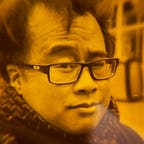Let us define an original as a text in the language it was written — a text without translation. Here is “original” used in a sentence: “After studying ancient, Greek grammar, I read the originals, i.e. The Iliad, Plato’s Dialogues, etc.”
This definition comes from the turn of phrase, “in the original language.” Scholars are often asked, “Did you read it in the original language?”
Why is science fiction not as rich of a genre than the study of originals? This is not a hate piece on science fiction. One of my favorite books as an 8 year old child was the novelized version of Star Wars which I read so many times that the binding began to tear. As an adult, Cixin Liu’s Remembrance of the Earth’s Past (地球往事, Dìqiú Wǎngshì) trilogy, is a must read for its vision of humanity’s future, or the idea that First Contact is so flawed that it must be rejected. (It’s also inspired many to learn Mandarin to read the original.)
Rather, this piece is more about the current and past limits of science fiction, and how the study of originals reveals areas worthy of investment for richer world building.
Studying originals often leads to etymological rabbit holes, but ones worth exploring. Let us take the word “hero.”
When Americans think of hero these days (2022), I imagine they think of the DC or Marvel “universes.” A hero is someone with superhuman and/or supernatural powers and/or technological powers beyond ordinary people. Sometimes this hero is merely a product of evolution, which seems to be the case in the Unbreakable trilogy. The news made Volodymyr Zelensky (Володимир Зеленський) a hero for defying the Russians and staying in Kyiv to rally his people and fight him. After offering to evacuate him from Ukraine during the Russian Invasion, the US Embassy attributes this quote to him:
The fight is here; I need ammunition, not a ride.
An essential ingredient for heroism, too, is life saving.
But what about the original meaning of hero? Where does it first show up? We have to go to what is considered the first masterpiece of Western literature, Homer’s Iliad, a tale of the Trojan War. The inspiration for the work dates to around the late Broze Age (1100 BCE), whereas the work is thought to be written around the 8th century BCE. However, dating this work is controversial. It’s topic is the very first word in this original: rage (μῆνιν).
Here are the first few lines:
μῆνιν ἄειδε θεὰ Πηληϊάδεω Ἀχιλῆος
οὐλομένην, ἣ μυρί᾽ Ἀχαιοῖς ἄλγε᾽ ἔθηκε,
πολλὰς δ᾽ ἰφθίμους ψυχὰς Ἄϊδι προΐαψεν
ἡρώων, αὐτοὺς δὲ ἑλώρια τεῦχε κύνεσσιν
οἰωνοῖσί τε πᾶσι…
Of Rage, goddess sing, and of Achilles, son of Peleus, murderous — how many multitudes of Achaeans, stout and hearty souls, did he send to hell? They were heroes (ἡρώων — /heɪroʊoʊn/), but their bodies were carrion for dogs…
I say to myself the original word for heroes (in the genitive case), over and over again, to let it sink into me and become part of me. Hayrow-own /heɪroʊoʊn/, Hayrow-own /heɪroʊoʊn/, Hayrow-own /heɪroʊoʊn/…
Note: I am not a classicist, nor a philologist. But in the act of literally translating each word, a frightful and a horrific definition of hero emerges:
Heroes are Achaeans murdered by Achilles’s rage, left as carrion for dogs, and whose souls were sent to an afterlife.
Hades has a neutral-ish meaning for the ancient Greeks.
Instead of The Avengers, we can imagine multitudes of brave men slaughtered because of the anger of one individual — not so heroic after all but simply the tragedy of war.
A study of science fiction could never reveal something so rich simply because the ontology of the etymology of words does not exist in sci-fi… well at least not yet. But let’s say an author talented enough has something like machine learning generate something like a real world ontology of etymology. Even then, there’s still an archaeological world to contend with also. I’m thinking of manuscripts of the original that oftentimes contradict each other, or vary the original with a word or phrase here and there. When we run into the limits of the richness or world-building of sci-fi, we must always go back to the author, or use our imaginations to fill-in for the author.
When originals are studied there is no such limit or lacuna where we must ask the author. Instead, the limit on paper is the etymological reach of a word.
Originals are richer than science fiction. Science fiction ultimately refers back to its author. However, originals have an etymology and an archaeology which yields a richer context.
Update 3.23.2022: I got a text message from a Ukrainian friend. I ended my last message to her with Слава Україні! In her reply back to me she ended her text with Гуроям Слава! (Heroyam Slava — Glory to the Heroes) That word in the 4th line of the Iliad shows up again prominently for the whole world thousands of years later.
